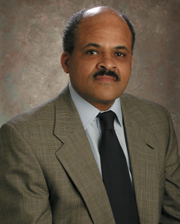3:00 p.m., May 23, 2003--When countries, such as Jamaica, emerge from colonial domination, they often seek to encourage a new national consciousness and honor new heroes, according to Howard Johnson, UD professor of Black American Studies and history.
 |
| Howard Johnson, professor of Black American Studies and history |
Johnson was invited to deliver the prestigious 19th annual Elsa V. Goveia Memorial Lecture at the University of the West Indies, Mona, Jamaica, in April and spoke on “The Politics of the Past: National Heroes in Post-Colonial Jamaica.”
The lecture series honors the first professor of West Indian history at the University of the West Indies, whose works include the classic study entitled “Slave Society in the British Leeward Islands at the End of the 18th Century.”
During his recent stay in Jamaica, Johnson also was a guest on radio and television shows.
“Jamaica abruptly became independent in 1962 when Great Britain offloaded its colonies,” Johnson said. “Prior to this time, the educational emphasis was on British history and culture. Children in school were taught about Adm. Lord Nelson and the Duke of Wellington and marched in parades on British holidays, such as Empire Day, the monarch’s coronation and birthday, with the goal of promoting loyalty to Great Britain and the monarch and creating an imperial identity.
“Now, attention is focused on new heroes who are associated with the country’s development as an independent nation,” he said.
These heroes include Marcus Garvey, the civil rights leader in the early 20th century who lived in Harlem for many years and was president of the Universal Negro Improvement Association, which promoted “pride in blackness,” Johnson said.
Another is George William Gordon, a Jamaican of color with a Scottish father. A major landowner in the 19th century, he advocated the amelioration of the black working-class condition. After a disturbance, Gordon was hanged by the colonial administration and now is viewed as a martyr and national hero.
Paul Bogle, a participant in that rebellion, is another hero in the Jamaican pantheon, Johnson said.
Historians view Jamaica’s history differently since decolonization as they search for a usable past in an effort to promote a national awareness, Johnson said.
Johnson currently is working on a historiography of Jamaica and a study of Chinese and Lebanese, minority traders who have lived in Jamaica for the past two centuries, and their relationship with the Creole population. The Chinese gravitated toward the grocery trade, and the Lebanese and others from the Middle East were involved in dry goods, he said.
Born in Jamaica, Johnson is the author of “The White Minority in the Caribbean,” “The Bahamas from Slavery to Servitude, 1783-1933,” “The Bahamas in Slavery and Freedom” and “After the Crossing: Immigrants and Minorities in Caribbean Creole Society.” He has, in addition, published numerous journal articles and book chapters on Caribbean history.
Joining the UD faculty in 1990, Johnson is a graduate of the University of the West Indies and received his doctorate from the University of Oxford.
Article by Sue Moncure
Photo by Kathy F. Atkinson

